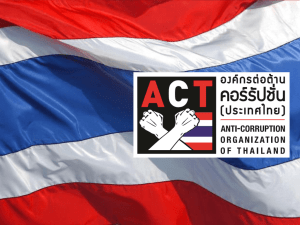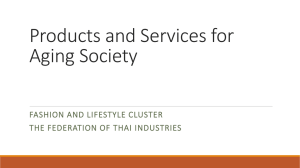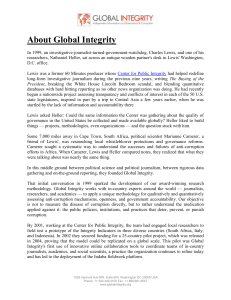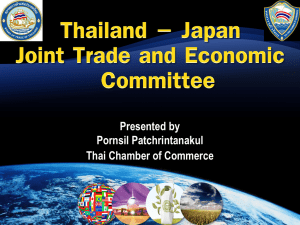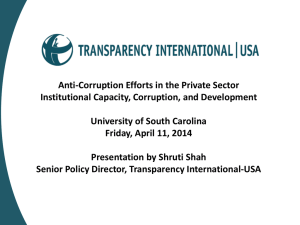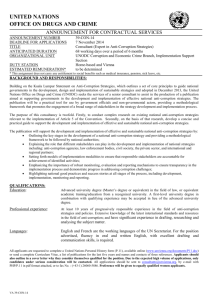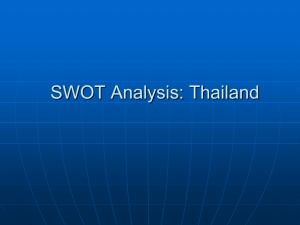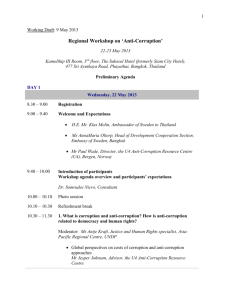Anti-Corruption Initiatives of Transparency Thailand
advertisement
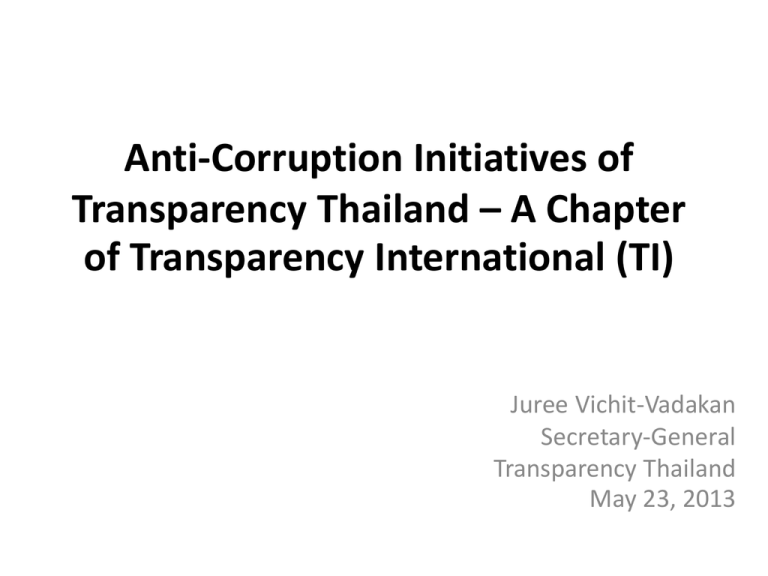
Anti-Corruption Initiatives of Transparency Thailand – A Chapter of Transparency International (TI) Juree Vichit-Vadakan Secretary-General Transparency Thailand May 23, 2013 I. Transparency Thailand’s structure and strategies since inception - Understanding and recognizing local realities and context - Cooperation and Collaboration with external and local partners - Maintaining independence and autonomy - Promoting transparency in various dimensions II. Critical Issues in Thai Society: The Contextual Realities - Pervasiveness of both ‘petty’ and ‘grand’ corruption - Corruption manifests itself in different spheres: Cross cuts and permeates throughout society. - Transparency is much cited but less practiced. III. Formal Anti-Corruption Measures Have Been in Place: - Since the 1997 Thai Constitution, many institutional mechanisms to curb and combat corruption such as - The National Anti-Corruption Commission - The Ombudsman - The Anti-Money Laundering Organization - The Public Sector Anti-Corruption Agency IV. Anti-Corruption legislations have been in place. - Public Information Act came into existence since 1997. Thailand has ratified the UNCAC - Recently a private sector-led coalition against corruption came into existence. V. The Key Questions to Ask are What has gone wrong? 1) Why does Thailand continue to face corrupt practices in spite of existing legal and institutional mechanisms? 2) What has gone wrong in Thai society? Initiatives of TI Thailand • Awareness Raising and Educating the Public through Various Measures: – Advocacy and dissemination: • Investigative Reports • Art Competition • Youth Debates • Media Interventions- Short Subjects–TV Spots –Newsletters The Great Awakening: Basis for Reformulating New Strategies • Legal and institutional mechanisms are crucial and necessary. • Values and mindset change even more critical: – Root Causes of Thai Situation 1. Deep-seated value system that perpetuates - Patron-client relationship- the debt of gratitude The Great Awakening: Basis for Reformulating Strategies - Cronyism - Nepotism - Self-interest vs. Public interest - Personalism - Collusion and Compromise 2. Fear of authority and passivity vis-à-vis the power/status holders 3 Tolerance for and benign neglect of ‘wrong doings’ against public good Strategy for action: • Value change is critical and unavoidable. • Thai people needs to embrace and endorse new values that will counter the behaviors that condone corruption and deter and obstruct the implementation of laws and the working of existing anti-corruption mechanisms A major project that Transparency Thailand implements in its 4th year (with the support of the BMA) An Anti-corruption curriculum or the “Growing Good Project” - How to introduce values from pre-school to high school 4 levels of interventions 1) Kindergarten-third grade 2) Fourth grade-Sixth grade 3) Seventh grade- ninth grade 4) Tenth grade-Twelve grade - 5 Core values to be emphasized through activities-based learning - Learning should be interesting, challenging, and fun - Teachers need to be on board: Workshops for teachers required. - All learning materials need to be provided - This innovative and creative initiative would forego intellectual property rights in order to serve larger society - A media component was built in to heighten awareness of the project: - Short TV spots - Back drops at bus stops - Sign posts - Bill boards - Radio and newspaper spots Accomplishments to date: • The term ‘Tor-Pai-Mai-Kong’ is widely used • About 3,000 BMA teachers trained • More than 1,300 teachers from the Catholic Council of Education schools trained • Only about 80 teachers from other provinces are trained • The curriculum is used in all BMA schools. • The theme song and dance are used by many schools throughout Thailand • There is spillover of this concept into public and private agencies. Lessons learned • Desired social change does not happen via legal and institutional change alone. • Values are crucial because laws and institutions do not and cannot operate when society is ill prepared for them. • Long-term change of human capital is crucial • Patience, endurance and multi-sector partnerships are central to value change. • Well-meaning, well-intentioned people need to be harnessed for synergistic effort in fighting corruption.
